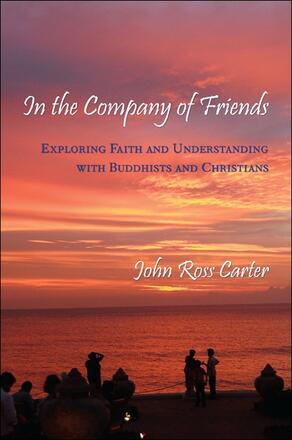
In the Company of Friends
Exploring Faith and Understanding with Buddhists and Christians
Alternative formats available from:
Buddhist-Christian reflection that uses friendship as a model for interreligious understanding.
Description
Winner of the 2014 Frederick J. Streng Award presented by the Society for Buddhist-Christian Studies
In this work of Buddhist-Christian reflection, John Ross Carter explores two basic aspects of human religiousness: faith and the activity of understanding. Carter's perspective is unique, putting people and their experiences at the center of inquiry into religiousness. His model and method grows out of friendship, challenging the so-called objective approach to the study of religion that privileges patterns, concepts, and abstraction.
Carter considers the traditions he knows best, the Protestant Christianity he was born into and the Theravāda and Jōdo Shinshū (Pure Land) traditions of the Sri Lankan and Japanese friends among whom he has lived, studied, and worked. His rich, wide-ranging accounts of religious experience include discussions of transcendence, reason, saṃvega, shinjin, the inconceivable, and whether lives oriented toward faith will survive in a global context with increased pressures for individualism and secularism. Ultimately, Carter proposes that the endeavor of interreligious understanding is itself a religious quest.
John Ross Carter is Professor of the Study of the Great Religions of the World, Professor of Philosophy and Religion, and Director of Chapel House at Colgate University. He is the author of On Understanding Buddhists: Essays on the Theravāda Tradition in Sri Lanka, also published by SUNY Press, and the editor of On Living Life Well: Echoes of the Words of the Buddha from the Theravāda Tradition.
Reviews
"…a handsome and durable volume … profound and sustained meditation on the relation between faith and understanding in interreligious dialogue. It is a work which will interest and inform Buddhist and Christian scholars alike, and challenges us to engage in ever more frequent and fruitful encounters both with each other and among ourselves. " — Eastern Buddhist
"This book is valuable for collections that emphasize theology, philosophy, or interfaith movements. " — CHOICE
"In the Company of Friends is groundbreaking. It brilliantly critiques current assumptions operative in the academic study of religions, theologies of religions, and interreligious dialogue and painstakingly sketches a new direction for learning inter-religiously. It will become a lightning rod of intense scholarly discussion and creative re-imagining in many fields related to religion and theology in the academy in coming years. " — John J. Makransky, author of Buddhahood Embodied: Sources of Controversy in India and Tibet
"This book is a distinctive contribution in the field of Interreligious Dialogue Studies, specifically Buddhist Christian dialogue, coming from more than three decades of scholarship and experience of the author. The fact that it is a testimony of an accomplished scholar and revered teacher, engaged in interreligious dialogue, giving not only detached accounts of ideas, but more relevantly, his personal engagement with the themes and issues discussed, makes the book an attractive read for those interested in the field. " — Ruben L. F. Habito, author of Healing Breath: Zen for Christians and Buddhists in a Wounded World